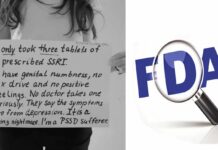Bartonella Infection, Psychosis and Tardive Dyskinesia | Beyond Meds
From Beyond Meds: Alternatives to Psychiatry: In Western medicine, dyskinesia is associated with infection when it’s not associated with a psych drug history, psychosis and neuroleptic drugs.
Reframing Mental and Emotional Pain from a Buddhist Psychology Perspective
The Five Hindrances perspective encourages exploring the underlying causes of suffering and developing strategies for coping and resilience.
“Confidential” 988 Conversation Records Shared with Corporations
Recordings of 988 callers’ voice, text, and chat conversations are being shared with researchers, AI developers, and corporations without consent.
FDA Panel Rejects MDMA-Aided Therapy for PTSD
From The New York Times: An independent group of experts expressed concerns that the data from clinical trials did not outweigh risks for treatment of post-traumatic stress disorder.
How to Explain Top Psychiatrists’ “Dr. Strangelove Exuberance” Unchecked by Reality
Leading psychiatrists appear unfazed that their theories and treatments are repeatedly proven to be scientifically invalid and discarded.
Researchers Plan to Retract Landmark Alzheimer’s Paper Containing Doctored Images
From Science: The study has been cited nearly 2500 times, and would be the most cited paper ever to be retracted, according to Retraction Watch data.
Dorothea Buck’s Memoir Tells of the Horrors of Twentieth Century Psychiatry: A “Hell Amidst...
Sterilized under Nazi law, Dorothea Buck fought throughout her life for psychiatric reform.
‘Illuminating Journeys’: Using Creativity for Change in Mental Health Treatment
From Health Justice: The Illuminating Journeys project supported people with lived experience of involuntary mental health treatment in British Columbia to inform mental health public policy by sharing their lived experience expertise in creative ways.
Grief Is Horrible – But It’s Supposed to Be. We Have to Feel a...
From The Guardian: An undead, colourless half-life lies ahead if we cannot find the courage to give ourselves the cacophonous gift of grief.
Antiseizure Drug Exposure in Pregnancy Linked to Large Risk of Autism, ADHD, and Intellectual...
Harms are “largely overlooked by psychiatry despite widespread usage,” according to the researchers.
Dramatic Rise in Police Interventions on 988 Callers
New data reveals that four times as many callers to 988 as previously publicly claimed are getting visited by police or emergency medical services.
Stealing My Mother From Me: The Horrors of Conservatorship
My beloved mother was mistreated, cheated, abused mentally, and alienated from her family by her conservator and the courts.
In the House of Psychiatry, a Jarring Tale of Violence
From The New York Times: At the American Psychiatric Association’s annual meeting, a patient described a restraint that haunts him, more than eight years later.
Don’t Call Me a Therapist
Psychology is closer to philosophy than medicine, laying a foundation for personal development that can lead to better adaptation.
How Anecdotes Sell Drugs: On the 30th Anniversary Edition of “Listening to Prozac”
From L.A. Review of Books: Listening to Prozac’s 30th anniversary edition is a tribute of sorts to the power of celebrity and to the persistence of the myth that depression is a brain disorder that can be abolished by ingesting one of Big Pharma’s magic bullets.
Psychiatric Patients Denied Period Products ‘For Safety Reasons’
From BBC: A former patient has conducted a study, backed by the National Survivor User Network, into patients' experiences after a "humiliating" stay in a psychiatric ward.
Americans Are Paying Billions to Take Drugs That Don’t Work
From Bloomberg: Companies are increasingly using fast-track approval processes to get unproven treatments to patients.
Remembering Bhargavi Davar: A Global Leader in the Struggle for Human Rights
Bhargavi Davar was a global leader in the struggle for human rights, with her work as a psychiatric survivor activist simply one aspect of that work.
Why You Don’t Want a ‘Diagnosis’ of ‘Borderline Personality Disorder’
From Beam Consultancy: There was a time that I thought the diagnosis was useful and people just needed to understand it better; now I’m convinced that it does more harm than good.
FDA Sued for Not Acting on Petition About Antidepressant Harms
From Maryanne Demasi Reports: It has been six years since the FDA was petitioned to update antidepressant labels to warn of the risk of PSSD, but so far the agency has failed to act.
Demedicalizing Depression: An Interview with Milutin Kostić
Justin Karter interviews Milutin Kostić on the fundamental flaws in depression research and its neglect of human complexity.
Wunderink: Antipsychotics Can Be Tapered Safely Without Increasing Relapse Risk
Tapering antipsychotics slowly and with supported decision-making may improve care for patients with psychosis.
When HVN Ireland Meets HVN Athens
Chairperson of Hearing Voices Network Ireland Owen Ó Tuama on the joy and power of community for voice-hearers across the globe.
The STAR*D Scandal: More on the Fraud
IPAK science webinars hosts a science webinar with Robert Whitaker on the "STAR*D Scandal: Fraud in the Largest Antidepressant Trial."
On Your Mind podcast, hosted...
Psychiatric Drugs Unmasked
Mad in America founder Robert Whitaker talks to psychiatrist Hannah Spier on her podcast "Psychobabble."
































